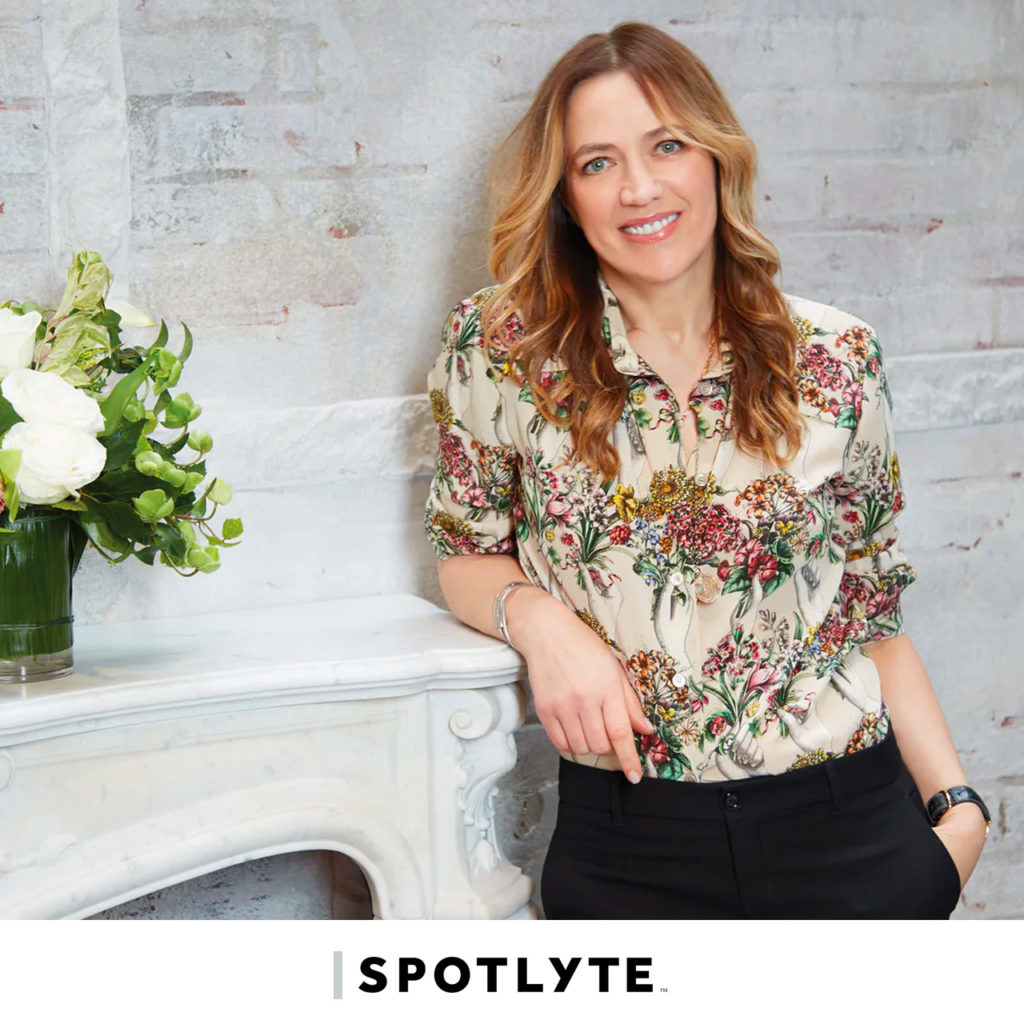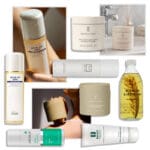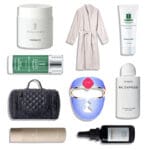I’m generally a humble person,” says 53-year-old esthetician Danuta Mieloch, “but there’s one thing I know: I give the best facial in the world.” Mieloch — the Polish beauty behind Rescue Spa℠ — has loved skincare since toddlerhood. She credits most of her early fascination to her sisters, who are nine and 10 years older than she. “When I was about four years old and my sisters were teenagers, they started breaking out,” she recalls. “They became very concerned with the way they looked.”
Mieloch believes that societal standards magnified her sisters’ concerns. In Poland, skin quality is paramount. “[Your skin] is like your passport,” she explains. “Most Polish women have beautiful skin, so I was worried about my sisters.” Determined to help her siblings, she grew obsessed with cleansing, masking, and everything in between. “When other young girls were playing with toys, I was mixing creams,” she says. “It was just something I was super passionate about.”
Little did she know that her early passions would lead to her opening one of the most esteemed spas in the United States. At 25, Mieloch moved to New York City to attend the prestigious Atelier Esthétique®. It was there that she was exposed to many of the cult-classic brands she swears by today, including Biologique Recherche®. As if by fate, Mieloch met Biologique’s founders, Madame Josette and Dr. Yven Allouche, who happened to be visiting New York City from Paris. Immediately, she was impressed with their skincare philosophies, which centered around microcurrents and gentle exfoliation. “Dr. Allouche was a visionary magician,” Mielcoh says, recalling her initial impression. She was so impressed, in fact, that she eventually moved to Paris to train directly with Dr. Allouche.
In the early 2000s, Mieloch returned to Manhattan, where she was working at various salons in the city. Though she was pursuing her passion, she felt like there was more she could be doing; the salons didn’t have the range of products and hi-tech equipment she knew were necessary for her to perform her best work. “I was completely at the mercy of the spa owners,” she says. “But I think the best ideas often come from frustration.”
The esthetician dreamed of opening her own salon; a playground of different machines and products that would allow her to give the best possible facial. In 2004, this dream blossomed into Rescue Spa. The spa’s first location was in Philadelphia — a city that seemed to be lacking skincare-centric spas. A little over a decade later, Mieloch decided she was ready to open a second location. “New York was always the dream, because I used to live there and partially feel like a New Yorker,” she says. One day, while sitting at ABC Cocina® in the city’s Flatiron District, she noticed space for rent and figured it must be fate. Mieloch signed the lease, and in 2017, the celestial beauty palace that is New York’s Rescue Spa opened its doors.
Today, the esthetician has ushered in a long list of celebrity clients, rave reviews, and a team of over 150 employees. She has continued to adapt to the changing landscape of skincare, while maintaining her focus on effective products and technologies above all else. Read on to discover the magic behind Mieloch’s treatments, her thoughts on female entrepreneurship, and how the Rescue Spa founder keeps her skin youthful and glowing at 53.
Spotlyte: When did you know that beauty could be your career?
Danuta Mieloch: Always. Everybody has a special talent, and I had the talent of recognizing what product was best for [each person’s] skin. [Developing that talent] required deep study and many years and many hours of doing facials, but it’s also just something that I love.
Spotlyte: What was it like to train with Dr. Yvan Allouche in Paris, and how did that training inform your approach to skincare?
DM: Biologique Lotion P50 was revolutionary at the time, because it had lactic acid. This was back when women either had facelifts or did those really deep [chemical] peels that basically burned half the face. Dr. Allouche believed in gentle exfoliation and gentle care, which I always believed as well. You know, you only follow what you internally believe.
I’ve known Biologique Recherche products for almost 30 years now, and I’m super excited that it’s gained its own popularity. I think social media has probably helped with that because they never invested any money into advertising; it was always kind of word-of-mouth and a cult favorite. But, once you try it, you really can’t go back to traditional products.
Spotlyte: Would you ever consider expanding Rescue Spa further?
DM: I’m not sure. I like to keep the quality [high]. A lot of time goes into training and maintaining quality, and more is not always better. For me, it’s about elevating the [current spas]. In Philadelphia, we’re actually moving to a new space, where Barneys [New York]® used to be, so I’m really focusing on that until it opens late next year. It’s all about tying the loose ends. Every time you open a new location, you realize [you want to make] corrections.
Spotlyte: How do you think Rescue Spa differed from other skincare spots when you first opened?
DM: There aren’t that many places that are owned by estheticians. I’m an esthetician first, and I still like doing facials, so I think I’m able to teach a newer generation, and that’s the best thing. Now, when I’m traveling for conferences or seminars, there’s always someone who’s worked at Rescue Spa or who models their own techniques after ours, so it’s a big compliment.
Spotlyte: What role does your team play in the larger Rescue Spa operation?
DM: We now have about 150 employees between the two locations. I have an amazing team, and a lot of estheticians have been with me for 15 years. They’re passionate about our culture, and they’re passionate about sharing.
Spotlyte: Sharing in what way?
DM: No one is ever competing for clients or anything like that. If we’re competing for anything, it’s how to give the best service every time. I still love giving personal training and I am very hands-on.
Spotlyte: Your ethos is, “Beautiful skin is a matter of choice, not chance.” Could you please elaborate?
DM: Skin is a living organ. Any skin can change if you take care of it, just like if you really decide to change your body through diet and effort. You just need to dedicate yourself to the right products, the right expertise, and the right advice. It doesn’t have to be elaborate. It’s important that my clients leave Rescue Spa not only looking beautiful and refreshed after a facial, but [knowing] that they can maintain beautiful skin on their own. Not everyone can get in to see me for a facial, so the most important thing is that they’re inspired to take care of their skin at home.
Spotlyte: What is the first thing you notice about people’s skin, and what does that tell you about them? How does it inform your facials?
DM: When I look at someone’s skin, I know exactly what they do and what they don’t do. I can quickly recognize if they’re using [prescription] tretinoin, if they’re lasering, if they’re peeling, if they’re over- or under-cleansing, all that. I don’t necessarily share that right away, but I know. So, I can coach them gently. There are also people who use dozens of products, and I have to put them on a so-called “skincare diet.” You know, a buffet is good once, but otherwise, you need to order à la carte.
[Editor’s note: Retinol shouldn’t be used by women who are pregnant, considering getting pregnant, or nursing. Please consult with your doctor before use.]
Spotlyte: How often should we be getting professional facials?
DM: Ideally, once a month. It’s great to tap into that skin regeneration cycle, which is every 28 days or so, depending on age.
Spotlyte: How often do you personally see clients?
DM: I no longer do as many facials, because between managing the two locations, I don’t have as much time. I also recently bought a farm, so that’s my next passion project. I really see clients one or two days a week, and I spend a lot of time training.
Spotlyte: Tell us more about your farm!
DM: Every business should have an additional mission and a plan to give back. I think the way we eat and the way we grow food have to be changed, and I wanted to learn what it’s like to do that. My farm isn’t that big — it’s about 40 acres — but I’m planting orchards, and I’ll be bringing fruit into the spa, so it’s kind of farm-to-spa. The ingredients are really special to me, and I’m excited to learn about the benefits that they all have for skin. The farm is in Pennsylvania, about an hour and a half from New York City. Some people buy a beach home; I needed my green space. It’s starting slow, but we’ll see how it evolves.
Spotlyte: What has your experience been like as a female entrepreneur in the beauty arena?
DM: First of all, I’m surrounded by women — out of 150 employees, probably 140 are women — and most of my clients are women. I hope that I inspire younger women to go out there and do it. I came to this country with $20 in my pocket, and now I’m here.
Spotlyte: Do you have any advice for other women looking to start their own businesses?
DM: Anything you want to do, you can. You just have to really learn and apply the knowledge, and start working somewhere. You can’t be afraid of failure, and you have to take risks — but the risks have to be smart. You have to believe in yourself and what you do. I would advise young women to roll up their sleeves and work in an industry that they’re passionate about, so it’s no longer work.
Spotlyte: How do you adapt to changing trends and needs in the skincare space?
DM: I’ve been trying to convince women to stop using bars of soap [on their faces] for 15 or 20 years now. Now, I see younger women wanting to take care of their skin. I love this generation! I have huge faith in them. They’re so much more aware of how we eat, what products we’re using, and where they come from.
Spotlyte: When you get facials, do you perform them yourself, or let someone else work on your skin?
DM: I always get a facial from someone else. There’s nothing better than lying down and having someone work on you. It’s about relaxation and human touch. That’s the part that machines really cannot replace.
Spotlyte: What is your nightly skincare routine?
DM: During the day, I usually wear a bit of makeup, and certainly sunscreen. [Unfortunately], I get lots of exposure to pollution, too. So at night, it’s important for me to remove all of that. First, I remove that layer of makeup or sunscreen using a milky cleanser with a bit of enzyme powder added in. After cleansing, I balance my skin with either Biologique Recherche’s P50 or another balancing toner. This removes any residue and prepares the skin to receive a serum, a multi-peptide, or a retinol — I like to alternate. I never use retinols every day. I probably use them two days a week, and I like Environ’s®. This winter, I’ve been trying Augustinus BaderTM moisturizer in the evenings.
Spotlyte: What about your morning skincare routine?
DM: In the daytime, it’s all about layering. Biologique has the quintessential serums that protect and moisturize. My morning cleanse is pretty fast, because I feel like if I’ve done a really great job at night, morning is that much easier. Sometimes, I mask in the morning; when I do, I always mix Masque Vivant with Masque Vernix. I’m getting a little bit drier now that I’m getting older, so I feel like anything that moisturizes and plumps is really good for me. I usually use sunscreen from Institut Esthederm or Environ SPF 30, which is a little thick because of the zinc, but I love it.
Spotlyte: How do you de-stress after a hectic day at work?
DM: I practice yoga and meditation, so that keeps me pretty balanced. I love a good glass of wine, or dinner with friends, or spending time with my puppy and my cat. The best place for me to de-stress right now is my farm. When I’m in nature there, it’s just magical. I love watching the trees grow and seeing the seasons change. It really just puts things into perspective. Seeing the sun rise and set is a beautiful cycle that’s a little bit like life: There are highs and lows, but you trust that the next day will bring a sunrise.
More about Danuta Mieloch



